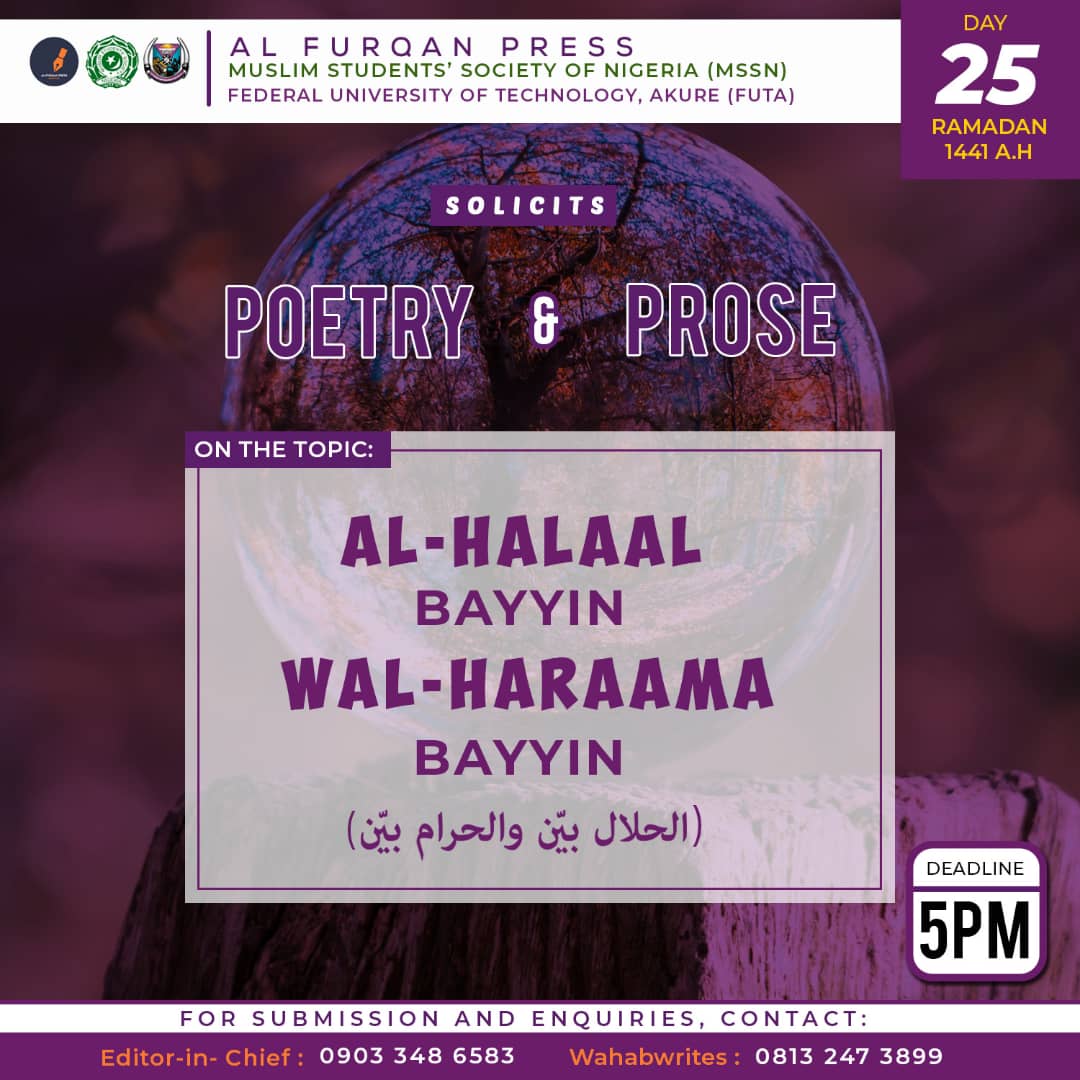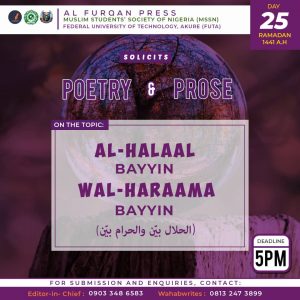#InTheLightOfRamadan Poem and PROSE by Alfurqan PRESS, Day 25

Table of Contents
PREAMBLE

According to Islam, ‘the first principle established by Islam is that the things which Allah has created and the benefits derived from them are essentially for man’s use, and hence are permissible. Nothing is Haram except what is prohibited by a sound and explicit Nass (Qur’anic verse or clear, authentic and explicit Hadith) from the Law-Giver.’
This leads us to understand that the sphere of forbidden things is very small, while the sphere of permissible things is extremely vast.
On the authority of Abu ‘Abdullah, Al-Nu’man Ibn Bashir both, who said : ‘I heard Allah’s Messenger (SAW) say: “The Halal (lawful) is clear and the Haram (prohibited) is clear, and in between them there are some things that are doubtful, which most people do not know – if they are Halal or Haram – Thus, whoever avoids the doubtful, safeguards his religion and honor, but one who engages in the doubtful, falls in the Haram.”
The word “Halal” has entered English dictionaries. It literally means “lawful”. In technical terms, it means the name given to the legal category of things which are permissible in Islam. Halal is that which has been made lawful through the Holy Qur’an or through the Sunnah of the Beloved Prophet (blessings and peace of Allah be upon him).
In the same vein, “Haram” literally means the “prohibited or unlawful”. In technical language it means that which the Law-Giver has absolutely prohibited, i.e. in the Holy Qur’an or in the sound clear Sunnah; anyone who engages in it is liable to incur the punishment in this world.
In the eye of Shari’a, there are different degrees of Haram. It may be major, minor and disliked.
By the way, the right to make lawful and to prohibit is the Right of Allah alone.
This is a beautiful simile to show us that those who violate Allah’s prohibitions will be punished (May Allah save us from this).
BOTTOM LINE
This Hadith addresses the believer’s conscience, which is the overseer and whose duty is to take charge of work and see that it is properly done. In simpler words, it is the criterion that shows the Muslim’s adherence to Halal, avoiding the Haram and keeping away from committing doubtful actions.
It urges Muslims to avoid doubtful actions since committing them could lure one to dare the prohibited actions themselves.
This great Hadith leads us to mention a number of rules concerning the Muslim’s behavior and conduct individually and in society. Among them are:
1. The Halal is very clear in Islam. All wholesome things, including lawful foods and drinks, clothes, good adornments, marriage, etc. since the basic principle refers the permissibility of things as long as there is no text [from the Qur’an or Sunnah] that forbids.
2. The Haram is also clear and limited. For instance, dead meat, blood, the flesh of swine, wine intoxicants, killing others, perjury, ingratitude, theft, bribery, adultery, fornication, usury, interest, swearwords, insult, cheating, envy, hatred, lying and other similar things that good people avoid.
3. Whatever is conductive to the Haram is itself Haram.
4. Good intentions do not make the Haram acceptable.
5. The Haram is prohibited to everyone alike.
6. The prohibition of things is due to their impurity and harmfulness.
7. Necessity dictates exceptions.
However, this Hadith adds that “there is a grey area between the clearly Halal and the clearly Haram”. This is the area of what is doubtful. Some people may not be able to decide whether a particular matter is permissible or forbidden, such confusion may be due to either to doubtful evidence or because of doubt concerning the applicability of the text to the particular circumstances or matter in question.
In relation to such matters, Islam considers it an act of piety for the Muslim to avoid doing what is doubtful in order to stay clear of doing something Haram. The permissible is clear; the prohibited is clear too.
As a writer on this platform, it is expected that you weave your thoughts together and write a mindblowing piece on the aforementioned topic. Kindly remember that the best two writers of Al-furqan Press MSSN FUTA are awarded at the close of the Week.
INSTRUCTIONS
All aforelisted writers should write a 150-200 words prose (short stories, essays) or poem on the topic using the following format:
_1. #Day25 (Open with this hashtag)_
_2. Topic (Write down the topic)_
_3. Writeup (Write the piece)_
_4. Your Name or Pen Name_
_5. #InTheLightOfRamadan #MSSNFUTA
(End with the hashtag)._
Pls feel free to write. Anything would do except plagiarised contents!
NOTA BENE: Kindly drop your work on this platform as soon as you are done with it. All writers are also enjoined to share the graphics of each day’s topic on their Social Media channels for the sake of publicity.
Deadline for Day 25 Submission is 5pm in the evening
Jazakumullahu Khair!
YOU CAN READ ALL OF MSSN FUTA DAILY #InTheLightOfRamadan ARTICLES HERE



0 Comments